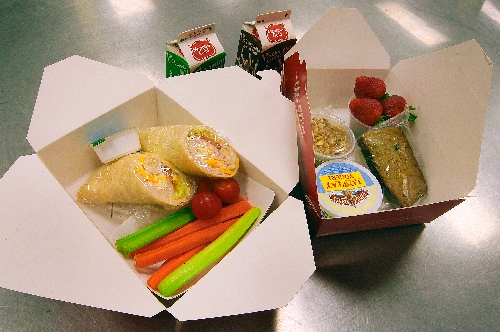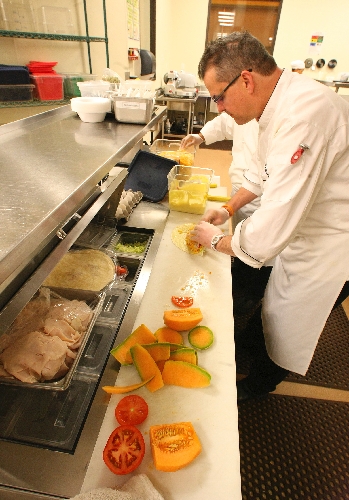Programs strive to fill gap caused by absence of school meals for children
George Lyke's young grandchildren usually have breakfast and lunch at school, as participants in the free and reduced-price meals program. But for the first time in recent memory, Clark County schools are closed this summer, so they, like elementary-school children across the valley, are forced to find alternatives. And local food programs, community organizations, businesses and volunteers are working to fill the gap.
Lyke takes his four grandchildren, ages 4 through 9, every weekday to the Family Youth Enrichment Center, one of the sites across the valley that is part of the Summer Food Service Program, a collaborative effort among Three Square food bank, the Culinary Academy of Las Vegas and the Clark County School District.
"I think it's a good deal," Lyke said. "It makes sure they get a properly balanced lunch and breakfast." Plus, he said, because of the center's activities and adult supervision, "they're able to interact with other kids without getting in trouble trying to find something to do."
Exact numbers aren't available, but food program organizers estimate that 65,000 local elementary-school children who normally eat breakfast and lunch in school can't this summer because of the schedule change from a 12-month to a nine-month calendar that was prompted by budgetary shortfalls. Overall, 150,000 local students in elementary, middle and high schools receive free or reduced-price lunches during the school year, noted Karen Vogel, a registered dietitian and nutrition program consultant with the Nevada Department of Education Office of Child Nutrition and School Health.
The Culinary Academy of Las Vegas (formerly the Culinary Training Academy) began sponsoring summer food programs about 10 years ago, gradually expanding to include after-school programs, said Steven Horsford, chief executive officer.
"For several years, we were the only provider," he said. That changed when Three Square opened in December 2007.
Brian Burton, president and chief executive officer of the food bank, said work on the collaborative Summer Food Service Program began two years ago, when it became clear that the school schedule would be changing.
"We've been ramping up, anticipating this," Burton said. The coalition has numerous community partners in the form of churches, libraries and the like, who "are all helping us get the word out because a lot of them end up being sort of drop-offs for kids," he added. An informational campaign also was launched while students still were in school.
Sites include Boys and Girls Clubs, community centers and churches (for lists, visit www.ThreeSquare.org, 539-9008; or www.TheCulinary Academy.org, 924-2100). At some sites, the food bank supplies the food and center personnel serve it. Other sites are sponsored by the Culinary Academy, and in addition to preparing and delivering meals, they handle the paperwork and train site staff on sanitation and health standards.
So far this summer, Burton said, the food bank's sites have served 36,000 meals. Two years ago, slightly fewer than 40,000 were served during the entire summer.
"It's good that we're able to make that difference in terms of access and being able to help these families really get the food that the kids need," Burton said.
Meals include kid favorites such as pizza and turkey nuggets, all of which are ready-to-eat and served in a rotation of about 15 variations. But zucchini-banana bread, prepared by Three Square chefs, is both healthful and extremely popular with kids; it's sometimes served for breakfast along with milk, juice and a piece of fruit.
The sites are open weekdays, and anyone age 2 through 18 may participate. A few additional sites are closed to the public because they're enrolled programs.
Some local businesses and individuals also are partnering directly with schools to ensure that kids don't go hungry. Sherrie Gahn, principal of Whitney Elementary School at 5005 Keenan Ave., near Tropicana Avenue and Boulder Highway, said 100 percent of her students live in poverty and 85 percent of them -- most of whom are homeless -- receive free and reduced-price meals during the school year.
As word of Whitney's need has spread, its pool of donors rose to 500, with 200 donating consistently, Gahn said. They range from Station Casinos and the Eastside Cannery to churches and individuals.
But then, she noted, "CBS Evening News" broadcast a segment on the school June 9.
"Oh, my word," Gahn said. Some $41,000 came in, with an additional $50,000 from Family to Family and another $50,000 promised by another organization, she said.
"I'm dumbfounded and truly humbled by the whole thing," Gahn said. "Literally what that money does is it puts food in my kids' mouths."
Freed's Bakery recently sold 3,012 cupcakes in a three-day period to raise $8,500 for the school.
"It is unthinkable to me that we send so much money to other countries and we have kids right here in our own town that don't have anything to eat over the weekend or when their school is closed for any length of time," said Freed's owner Joni Fried.
Whitney has its own food pantry. The school is open through the end of the month for GED and English-speaking classes, Gahn said, and the school office will reopen Aug. 1. Many donations come in the form of nonperishable food products, and the cash helps make up for shortfalls and with emergencies such as utilities or rent.
"We feed all of our families all through the summer," she said.
According to Feeding America, five years ago, one in eight Nevadans was considered food-insecure; now that number is one in six, Burton said.
But, he continued, the summer feeding program has been underutilized, with only 15 percent to 18 percent of eligible families participating, "and we think that's mainly because of an awareness issue"; hence, campaigns to get the word out.
"I hope more families take advantage during these tough economic times," Horsford said.
"The need is still growing," he added. "We need more sites, we need more parents to bring their children to sites to receive these meals. In some cases, this may be the only nutritious meal a child receives during the summer months." While food programs have grown, he said, the need has grown because of the crushing blow to the local economy.
"Food insecurity and social indicators really are tied to the unemployment," Burton said. "As long as that is as high as it is, there's going to be this perilous need."
Contact reporter Heidi Knapp Rinella at hrinella@reviewjournal.com or 702-383-0474.
























